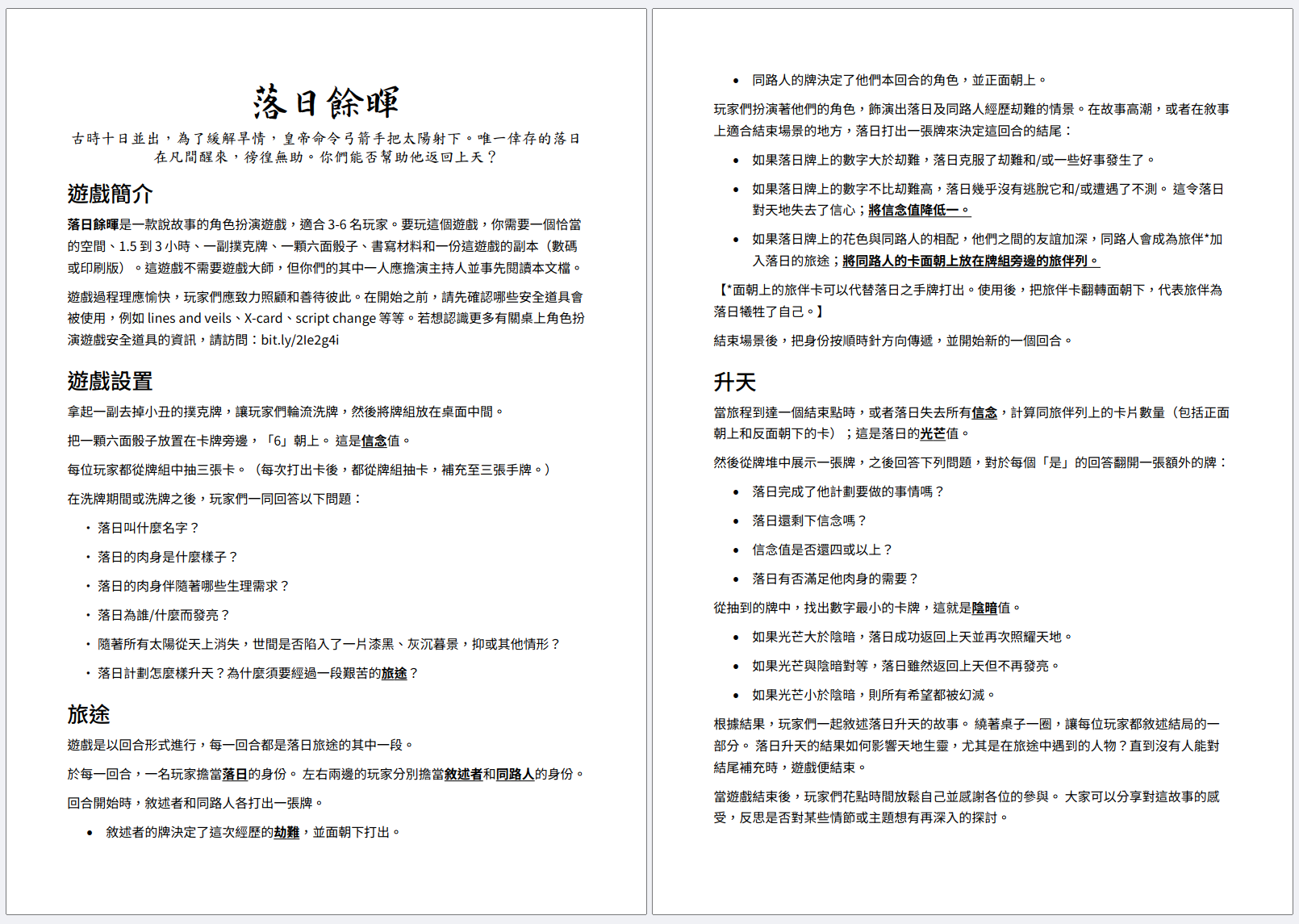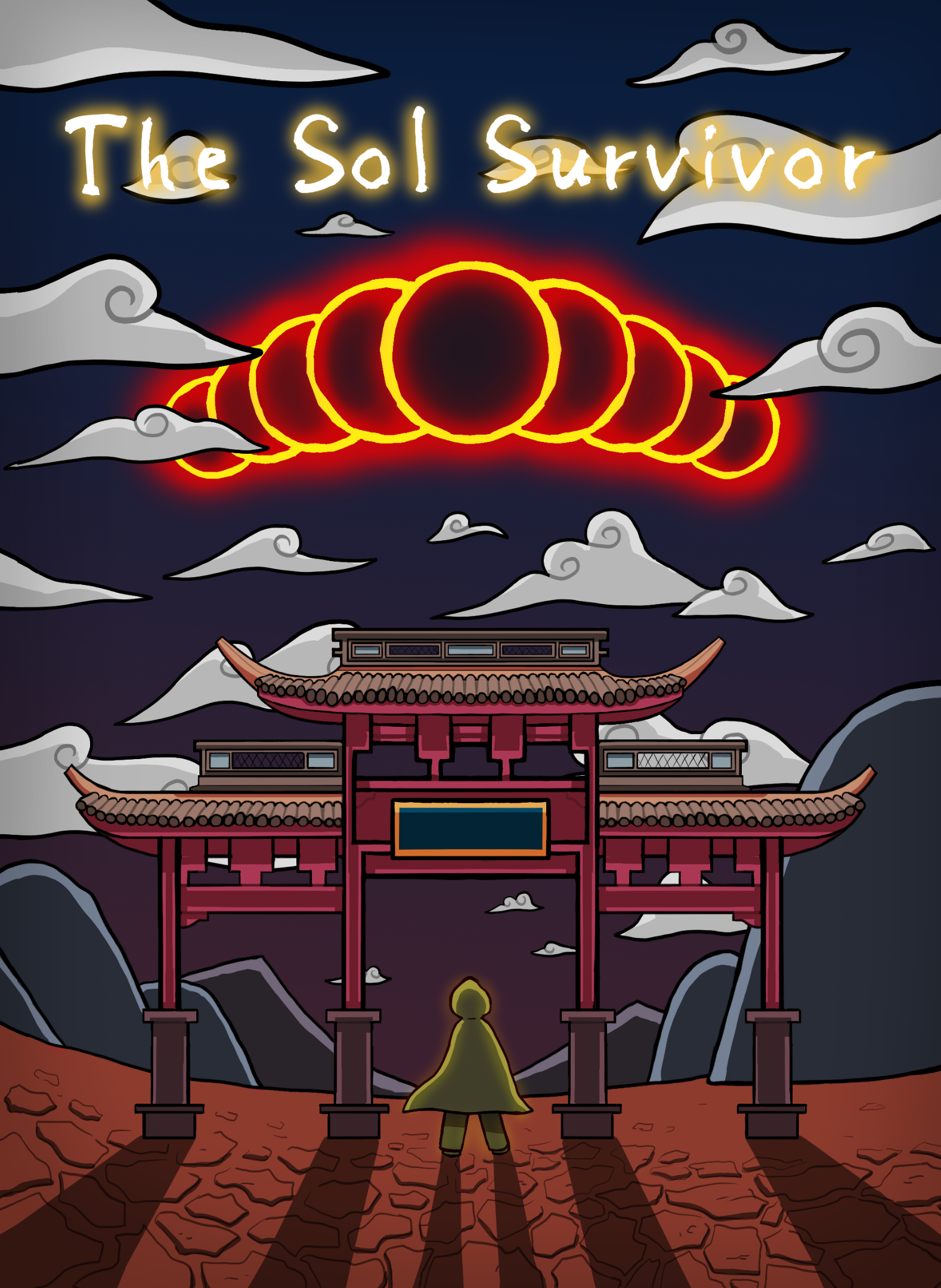落日餘暉 (The Sol Survivor Chinese Translation)
The Sol Survivor » Devlog
I started translating The Sol Survivor last year, but I ended up getting distracted by other projects. Translation is much harder than I thought it would be, especially when it comes to translating the idioms, and it took me a long time to find matching idioms appropriate to the setting.
I look back to my old notes today, and realised I have translated most of the rules already. I just haven't gotten around to the "Examples and FAQs" section of the rules. Anyway, I have uploaded the text-only PDF to the game's page, so that people can read the Chinese translation if they are interested.
(Note: Found and fixed a typo, and uploaded it as v1.01)

Files
落日餘暉 (The Sol Survivor Chinese Translation) v1.01.pdf 417 kB
Feb 28, 2024
Get The Sol Survivor
Buy Now$9.99 USD or more
The Sol Survivor
A Chinese Mythology Role-playing Game
| Status | Released |
| Category | Physical game |
| Author | W.H. Arthur |
| Genre | Card Game, Role Playing |
| Tags | chinese-mythology, Folklore, gbts, guided-by-the-sun, mythology, Tabletop, Tabletop role-playing game |
More posts
- The Sol Survivor: Print Edition PDF now available!Sep 11, 2021
- The Sol Survivor v1.11 typo fixes and text-only version for accessibilitySep 13, 2020
- The Sol Survivor v1.1 updateDec 29, 2019
- The Sol Survivor Mini-RPG Release!Nov 24, 2019
- The Sol Survivor Mini-RPG beta v1Jan 18, 2019

Comments
Log in with itch.io to leave a comment.
Hi, I noticed the Chinese translation you gave for "Cowherd" in the bestiary section was "牛郎", which might not be appropriate.
"牛郎" is technically correct, and I think, judging from the description, you were trying to invoke the myth of "牛郎織女" (The Cowherd and the Weaver Girl). But "牛郎" has been commonly used as a slang/idiom in the Chinese-speaking sphere to mean "gigolo".
In fact, when I googled "牛郎", most of the top results were articles about male hosts in male host clubs from Japan, which has been translated in Chinese as "牛郎". So the target audience for the translation would likely to find this to be unintentionally funny.
Thanks for commenting.
That's how euphemism works.
People use an innocent term to substitue something else that is considered taboo.
Cowherd/牛郎 is a popular romantic figure in Chinese mythology, which is why it is used as an euphemism for male sex workers.
If you go on Urban Dictionary, you can find alternative meanings to a lot of seemingly innocuous terms. (I was shocked when I looked up the meaning of salad, especially of the tossed variety.)
One can read the D&D rulebook and snicker every time the word "blow" is used.
Language is something that evolves with time and trend. I'm just saying, as an ethnically Chinese person whose mother tongue is Chinese, the mythical figure was not the thing I think of when I first saw the word.
Salad is still used to in the media and the mainstream to mean as a type of food. While the word "牛郎" is whole different matter.
As a Cantonese speaker, the mythological meaning of 牛郎 is the first one that comes to my mind. Outside of its mythological context, I can only see the word refer to male prostitutes in Japan and maybe Taiwan.
According to this Wiktionary page, every Chinese-speaking region has its own euphemism for "male prostitute", with only Taiwan using 牛郎: https://en.wiktionary.org/wiki/%E7%89%9B%E9%83%8E